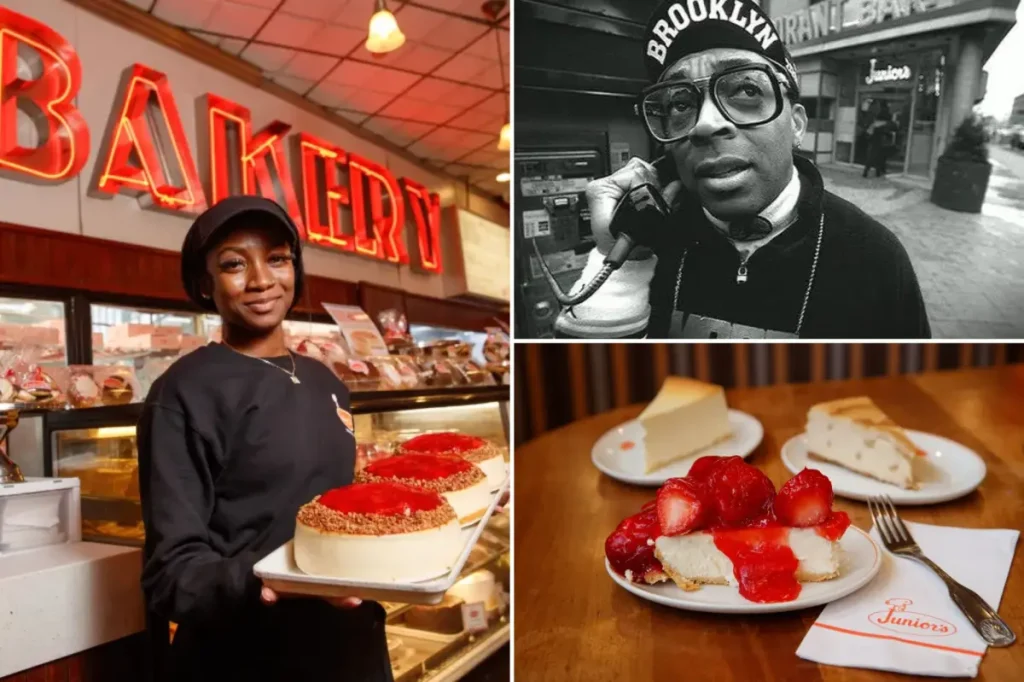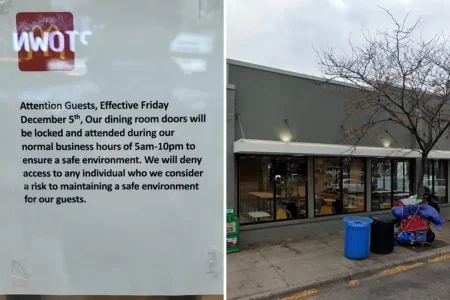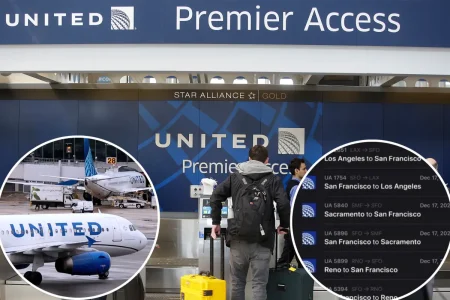Junior’s Cheesecake: A 75-Year Love Affair with New York
In the pantheon of New York landmarks, certain icons stand eternally recognizable—the Empire State Building piercing the skyline, Lady Liberty raising her torch in the harbor, and a perfectly creamy slice of Junior’s cheesecake sitting on a plate. As Junior’s celebrates its diamond anniversary of 75 years at the corner of Flatbush and DeKalb Avenues in downtown Brooklyn, it has cemented its place not just as a restaurant, but as a cultural touchstone that has brought together generations of New Yorkers. What began as a family business in the autumn of 1950 under Harry Rosen has evolved into something far greater—a place where, as three-term Brooklyn Borough President Marty Markowitz puts it, “the quintessential New York restaurant.” For decades, Junior’s has been where Brooklynites and visitors alike have marked life’s milestones: first dates, anniversary dinners, graduation celebrations, and everything in between. The restaurant represents something increasingly rare in today’s rapidly changing city landscape—continuity and connection to New York’s vibrant past.
The magic of Junior’s extends far beyond its neon sign and cozy booths—it lives in the famous faces who’ve made it their regular haunt and the everyday New Yorkers who consider it a second home. Former Mayor Rudy Giuliani once called it “one of the tastes that makes the city what it is,” while filmmaker Spike Lee counts himself among the faithful regulars, even filming on location there and celebrating Juneteenth with Rev. Al Sharpton at its tables. But perhaps more meaningful are the countless family stories intertwined with the restaurant. “There’s people I meet who say, ‘My parents went on their first date at Junior’s’ or ‘I had my high school graduation there,'” reflects Alan Rosen, the third-generation owner now steering the family legacy. From the Brooklyn Dodgers who frequented Junior’s before their heartbreaking departure to Los Angeles in 1957, to the modern-day celebrities who duck in for a slice of comfort, Junior’s has welcomed them all with the same warm hospitality. This democratic approach to dining—where a construction worker might sit next to a Supreme Court justice, both savoring the same cheesecake—embodies the spirit of New York itself.
While Junior’s menu has always offered a full range of comfort foods, it was their signature cheesecake that ultimately transformed the restaurant from local favorite to national treasure. The secret to their famed dessert lies partly in its distinctive sponge cake crust—a deliberate departure from the graham cracker base used by most competitors—and the unapologetic use of full-fat cream cheese (an astonishing 4 million pounds annually). It wasn’t until 1973, however, that Junior’s cheesecake became the stuff of legend, when Village Voice columnist Ron Rosenblum boldly proclaimed it “the best cheesecake in New York.” Months later, New York magazine assembled a panel of judges who, in a blind taste-test, unanimously crowned Junior’s the city’s cheesecake champion. Food writer Dan Pelosi notes that eating at Junior’s delivers “instant comfort and nostalgia,” while chef Jake Cohen attributes their sustained success to “tradition and attention to detail,” adding that they’ve achieved perfection by “focusing on doing one thing perfectly.” This commitment to quality has allowed Junior’s to expand beyond Brooklyn to Times Square, Las Vegas, and even establish a 103,000-square-foot bakery in New Jersey to handle the demand for their desserts through a robust mail-order business.
The path to culinary immortality hasn’t been without significant challenges. Junior’s weathered Brooklyn’s severe economic decline in the 1970s when many businesses abandoned the borough. In 1981, a devastating fire threatened the restaurant’s very existence, with anxious neighbors reportedly chanting “save the cheesecake!” as firefighters battled the blaze. The restaurant has stood resilient through historical inflection points: during the citywide blackout of 1977, an eight-year-old Alan Rosen was called in by his father to help; on September 11, 2001, while much of the city shut down in shock, Junior’s set up outdoor tables offering drinks to shell-shocked workers streaming over the bridges from Manhattan; during the cream cheese shortage of 2021 that threatened their signature product; and throughout the COVID-19 pandemic, when they pivoted to takeout to keep the business alive. Each crisis has somehow strengthened rather than diminished the restaurant’s place in New York’s heart, demonstrating the resilience that both the establishment and its home city are famous for.
Today’s challenges come in different forms, primarily the relentless march of gentrification that has transformed downtown Brooklyn almost beyond recognition. The original Junior’s, once one of the tallest buildings in its vicinity, is now dwarfed by gleaming skyscrapers that have sprouted around it. This new reality came to a head in 2013 when developers offered the Rosen family $45 million in cash for the property, intending to demolish the building and construct yet another tower. For Alan Rosen, the decision was agonizing—so much so that he sought therapy to work through it. What ultimately helped guide his choice was the outpouring of customer support, with loyal patrons from across generations coming forward to express what Junior’s meant to them. “This is the life’s work of my family,” Rosen reflected on his decision to refuse the offer. “As I said at my dad’s funeral, his entire life was contained within these four walls.” In choosing preservation over profit, Rosen affirmed something essential about New York’s soul—that some places matter too much to sacrifice at the altar of development.
As Junior’s enters its next quarter-century, it does so with the quiet confidence of an institution that has seen it all and served everyone. Its story is emblematic of the broader New York experience: immigrant dreams realized through hard work, family legacy sustained across generations, adaptability in the face of changing times, and a stubborn refusal to compromise on quality. While the city around it continues its perpetual transformation, Junior’s remains a constant—a place where New Yorkers of all backgrounds can find common ground over coffee and cheesecake. “We just keep grinding, pushing and plugging along,” says Rosen with characteristic New York determination. “We’re still in love with the business.” That enduring love affair—between a family and their restaurant, between a restaurant and its city—is the secret ingredient that no recipe could ever capture, ensuring that while empires rise and fall, Junior’s cheesecake remains eternal. In a city forever chasing the next big thing, there’s something profoundly comforting about a place that gets it right the first time and sees no reason to change.














